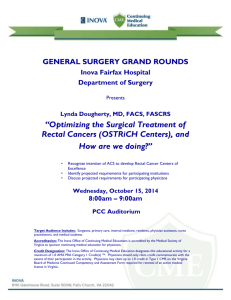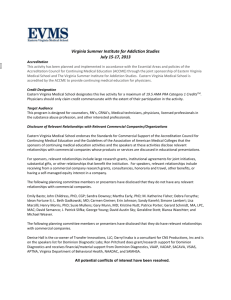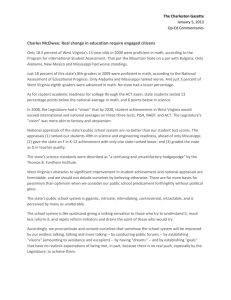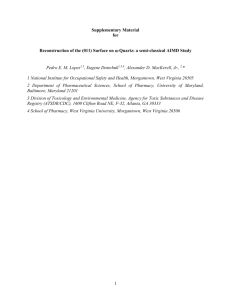Addressing Substance Abuse: Balancing Treatment and Prevention
advertisement
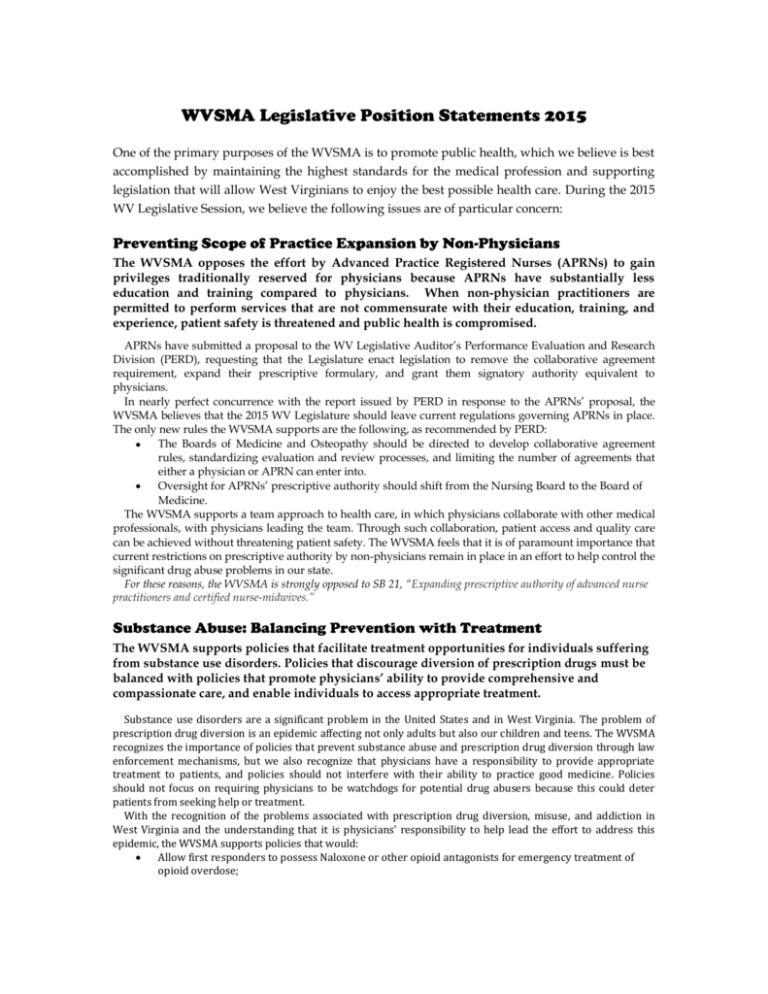
WVSMA Legislative Position Statements 2015 One of the primary purposes of the WVSMA is to promote public health, which we believe is best accomplished by maintaining the highest standards for the medical profession and supporting legislation that will allow West Virginians to enjoy the best possible health care. During the 2015 WV Legislative Session, we believe the following issues are of particular concern: Preventing Scope of Practice Expansion by Non-Physicians The WVSMA opposes the effort by Advanced Practice Registered Nurses (APRNs) to gain privileges traditionally reserved for physicians because APRNs have substantially less education and training compared to physicians. When non-physician practitioners are permitted to perform services that are not commensurate with their education, training, and experience, patient safety is threatened and public health is compromised. APRNs have submitted a proposal to the WV Legislative Auditor’s Performance Evaluation and Research Division (PERD), requesting that the Legislature enact legislation to remove the collaborative agreement requirement, expand their prescriptive formulary, and grant them signatory authority equivalent to physicians. In nearly perfect concurrence with the report issued by PERD in response to the APRNs’ proposal, the WVSMA believes that the 2015 WV Legislature should leave current regulations governing APRNs in place. The only new rules the WVSMA supports are the following, as recommended by PERD: The Boards of Medicine and Osteopathy should be directed to develop collaborative agreement rules, standardizing evaluation and review processes, and limiting the number of agreements that either a physician or APRN can enter into. Oversight for APRNs’ prescriptive authority should shift from the Nursing Board to the Board of Medicine. The WVSMA supports a team approach to health care, in which physicians collaborate with other medical professionals, with physicians leading the team. Through such collaboration, patient access and quality care can be achieved without threatening patient safety. The WVSMA feels that it is of paramount importance that current restrictions on prescriptive authority by non-physicians remain in place in an effort to help control the significant drug abuse problems in our state. For these reasons, the WVSMA is strongly opposed to SB 21, “Expanding prescriptive authority of advanced nurse practitioners and certified nurse-midwives.” Substance Abuse: Balancing Prevention with Treatment The WVSMA supports policies that facilitate treatment opportunities for individuals suffering from substance use disorders. Policies that discourage diversion of prescription drugs must be balanced with policies that promote physicians’ ability to provide comprehensive and compassionate care, and enable individuals to access appropriate treatment. Substance use disorders are a significant problem in the United States and in West Virginia. The problem of prescription drug diversion is an epidemic affecting not only adults but also our children and teens. The WVSMA recognizes the importance of policies that prevent substance abuse and prescription drug diversion through law enforcement mechanisms, but we also recognize that physicians have a responsibility to provide appropriate treatment to patients, and policies should not interfere with their ability to practice good medicine. Policies should not focus on requiring physicians to be watchdogs for potential drug abusers because this could deter patients from seeking help or treatment. With the recognition of the problems associated with prescription drug diversion, misuse, and addiction in West Virginia and the understanding that it is physicians’ responsibility to help lead the effort to address this epidemic, the WVSMA supports policies that would: Allow first responders to possess Naloxone or other opioid antagonists for emergency treatment of opioid overdose; Enact a Good Samaritan Law providing immunity for those seeking to help themselves or others experiencing an overdose; and Reclassify pseudoephedrine products, with the exception of those which scientific studies have shown to be tamper-resistant, as Schedule IV controlled substances. For these reasons, the WVSMA strongly supports SB 9 “Allowing law enforcement and emergency service personnel possess opioid antagonists;” SB 230 and HB 2045, Creating Overdose Prevention Act; SB 231, Allowing certain law enforcement and public safety personnel to possess and administer opioid antagonist; and HB 2009, ”Allowing State Police, police, sheriffs and fire and emergency service personnel to possess naloxone or other approved opioid antagonist.” Ensuring Medicaid Patients’ Access to Care The WVSMA supports policies which would ensure that Medicaid patients have access to quality care by reimbursing physicians at an adequate rate for their services. The Affordable Care Act has increased the number of Medicaid and CHIP patients in West Virginia by nearly 50 percent. In order to ensure that these patients have access to care, it is imperative that physicians be compensated adequately for their services. Data has shown that increasing Medicaid payments to physicians to a level that is equivalent to Medicare payments (“Medicaid parity”) can result in bettercoordinated, higher quality care for Medicaid patients. In addition, research has shown that Medicaid parity can result in an overall reduction in health care costs because these patients will be more likely to seek less costly office-based care, rather than hospital-based care. Protecting and Strengthening Medical Liability Reform Laws The WVSMA strongly maintains the need to preserve the integrity of the Medical Professional Liability Act and to protect against any threats to erode the current statute. At the same time, we support efforts to strengthen the Act and to clarify certain issues raised by the courts. Fourteen years ago West Virginia’s healthcare system was spiraling into a severe crisis. The lack of affordable and available medical liability insurance forced many physicians to either restrict the services they offer, move their medical practice out of state, or quit practicing altogether. Faced with the reality that West Virginia’s healthcare system was on the verge of collapse, the Legislature responded by passing two rounds of medical liability reform legislation. First, in 2001 the Legislature passed HB 601, which included numerous measures to help put the medical liability insurance market back on track. In 2003 the Legislature once again addressed the crisis with the passage of HB 2122, and was the first comprehensive medical liability reform that had passed in West Virginia in over 20 years and placed West Virginia at the forefront of most states in regard to such reform laws. The new law included a $250,000 non-economic damages cap, a $500,000 trauma cap, collateral source offset, elimination of joint liability, creation of a patient injury compensation fund, and more stringent medical expert witness requirements. Additionally, and critically important, the legislation provided the revenue and mechanism for the creation of a physicians’ mutual insurance company, a West Virginia-based insurer which is owned and operated by its policyholders. Long-term stabilization of the medical liability insurance market has hinged upon whether the WV Supreme Court of Appeals would uphold the caps on damages as constitutional. In June of 2011 the Court ruled, in a 4 to 1 decision, to do just that in MacDonald v. City Hospital. This ruling will go far, securing further stabilization of the market. The WVSMA supports SB 6 and HB 2006, “Relating to medical professional liability;” specifically, the provisions which broaden the definitions of health care providers, clarify the collateral source definition, and tighten the expert witness requirements. Improving West Virginia’s Perinatal Health The WVSMA supports initiatives to improve the health of pregnant women and children in West Virginia. The health of West Virginia’s babies has a tremendous impact on the state’s economy, workforce development, and family well being. Because of the declining status of the health of WV mothers and babies, the Perinatal Partnership was formed to address these needs. The WVSMA has been an active member in the group’s work. The Partnership and its partner physicians, hospitals, medical schools, nurses, and certified nurse midwives have begun quality initiatives to improve the state’s poor rates for pre-term birth, low birth weight and very low birth weight infants, primary C-sections, inductions, vaginal births after cesarean section (VBAC), and access and availability of obstetrical providers. The WVSMA, along with the WV Perinatal Partnership, supports and recommends the following policies to further the efforts on improving perinatal wellness. By working together, we can make sure that the 21,000 babies born each year in West Virginia and their mothers have the best healthcare possible to assure a healthy beginning: Offer prevention and treatment interventions for pregnant women who have substance abuse problems. Pregnant women who are found to use drugs and/or alcohol should be directed to early and regular prenatal care that incorporates as part of the practice, substance use detection, diagnosis, and referral for treatment with the goal of delivering a drug free infant. To ensure that women have trusted and confidential care available to them and that the physician patient relationship is protected, it is essential that the care is obtained without fear of retribution of any kind. Expand state education to adequately prepare our young West Virginians for parenthood. West Virginia women under 20 years of age have worse outcomes for their babies than any other age group of pregnant women, except for women over 40 years. Advance parenthood preparation of our young students could help the State significantly reduce low birth weight and preterm birth among women under 20 years of age, reduce school dropout rates, and decrease the state’s high rate of infant mortality, among other issues. Allow physicians to provide expedited partner therapy for STDs. To help decrease the risk of persistent or recurrent sexually transmitted diseases (STDs), the CDC recommends that physicians should be allowed to prescribe medication for both their patients and the patients’ partners, without requiring medical evaluation for the partners. In accordance with the CDC recommendations, the WVSMA supports state legislation that would allow expedited partner therapy. The WVSMA strongly supports SB 232 “Providing for expedited partner therapy.” Preventing the Criminalization of Medicine The WVSMA does not take a position on abortion, but we do oppose the criminalization of medicine, so we will oppose any bills that include criminal sanctions for physicians, who should be allowed to exercise clinical judgment without fear of being prosecuted. The WVSMA opposes provisions in HB 2153, “The Pain-Capable Unborn Child Protection Act” which call for felony penalties and civil actions against physicians who use their best clinical judgment to perform a lawful medical act. Ensuring Telemedicine Is Used Appropriately The WVSMA recognizes that telemedicine can help provide access to care in rural communities, but, in order to ensure quality of care, telemedicine providers must be appropriately credentialed and have active licenses issued by the WV Board of Medicine or Board of Osteopathy. Combating Poor Oral Health The WVSMA supports efforts to make policy changes which foster improved oral health for West Virginia’s children and families. Regrettably, West Virginia leads the nation in the percentage of our citizens with tooth loss and decay. By the time of high school graduation, over 80 percent of West Virginia youth have had dental decay; over 60 percent have had dental decay by age 8 and over 30 percent of West Virginia children suffer from untreated decay. Strikingly, over 45 percent of West Virginia adults, aged 65 and older, have lost all their natural teeth. Dental disease is the single most prevalent chronic childhood disease and correlates directly to other health concerns. With today’s tools and technologies, oral disease is almost 100 percent preventable and is cost effective, with the potential to save millions of dollars. Poor oral health can contribute to a lifetime of overall poor health, including diabetes and heart disease. The WVSMA supports the following recommendations to address poor oral health: • Encourage school-aged children to have dental exams at appropriate intervals; • Prohibit the sale of sugary snacks and beverages in schools; and • Address the use of smokeless tobacco among our youth by increasing the tobacco tax and increasing counter marketing and cessation programs. Promoting Tobacco Control and Clean Indoor Air Initiatives The WVSMA supports policies that protect public health by discouraging tobacco use and promoting clean indoor air. Such policies include increasing the tobacco excise tax, allocating sufficient funding for education programs designed to reduce or eliminate tobacco use and exposure to secondhand smoke, and supporting counties’ indoor air regulations. The WVSMA seeks to reduce or eliminate tobacco use and exposure to secondhand smoke by West Virginia citizens, especially children and pregnant women. Among the states, West Virginia ranks worst in the nation for smoking rates of adults and youth. We rank first in smoking during pregnancy and second overall in women smokers. Further, West Virginia has the highest rate of smokeless tobacco use in the nation with one in three high school students currently use tobacco and one in five males use smokeless tobacco. The deleterious effects of tobacco use affect not only smokers but also the public at large. Scientific studies clearly show that secondhand cigarette smoke is a hazardous, cancer-causing air pollutant. Exposure to secondhand smoke causes increased risk for disease and death in healthy nonsmokers and is the third leading cause of preventable death among nonsmokers. The prevalence of tobacco use in West Virginia translates to an enormous economic toll as the state annually spends $1 billion on direct healthcare costs of smoking, and another $1 billion on occupational costs due to smoking. The WVSMA joins the Coalition of a Tobacco Free WV in recommending a three-tiered approach toward addressing tobacco use: • Increase the Tobacco Excise Tax; • Provide adequate state funding for cessation education programs; and • Protect county clean indoor air policies. Strengthening and Preserving Safety Laws The WVSMA strongly supports strengthening West Virginia’s All-Terrain Vehicle safety law and maintaining the motorcycle helmet law for operators and riders of all ages. Although the Legislature passed the All-Terrain Vehicle (ATV) Child Safety law in 2004, more can be done to protect the health and safety of our citizens. The WV State Legislature has made positive strides toward ATV safety, but still needs to improve such safety laws, including the following: • Removing non-road-worthy vehicles from public roadways; • Expanding the mandatory helmet law; • Strengthening the requirement for ATV safety instruction to require hands-on safety courses; and • Prohibiting multiple passengers, with the exception of machines that manufacturers have designed for more than one passenger. Another important safety issue is that of preserving the motorcycle helmet law. In recent years, efforts have been made by various groups to repeal our critically important motorcycle helmet law. Such an action by the Legislature would be highly irresponsible. Helmets are the best known way to reduce motorcycle accident deaths and injuries. The WVSMA strongly supports the retention of our State’s current mandated helmet use law for all motorcycle operators and riders of all ages. Protecting Against a Healthcare Provider Tax The WVSMA applauds the completion of the phase-out of the healthcare provider tax. We strongly encourage the Legislature to reject any proposal to reinstate a healthcare provider tax in the future. The healthcare provider tax, imposed in 1993, was onerous and widely considered a burden on the health care provider community. In 2001 the Legislature passed a bill initiating the repeal of this tax on all individual practitioners through a ten-year phase out. As a result, on July 1, 2010 the tax on all individual health care practitioners, including physicians, was eliminated. The WVSMA thanks the Legislature for their foresight in the passage of this phase-out and for their fortitude in continuing down the path of repeal. The WVSMA strongly recommends that no similar taxes be considered in the future.
